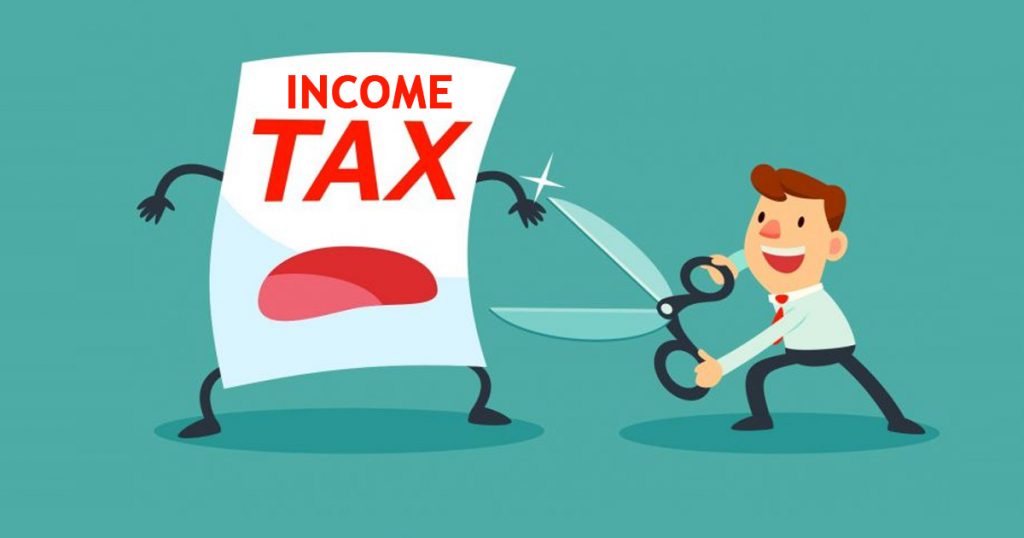
Expenses are planned after ensuring the earnings. One must also know the amount which will be levied by the government in the name of tax. The write-up highlights some key pointers for salaried employees according to which they can ensure their exact tax outgo.
With Gross Income of Less than Rs. 5 Lakhs
As per the recently introduced amendments, employees whose yearly aggregate is less than Rs. 5 Lakhs can avail for zero tax benefit and claim a rebate of all the taxable income under section 87A in Assessment Year 2020-21. Gross Total Income includes income from salaries, income from property, LTCG, interest from banks and other sources.
Read Also: Tax Clarification in Case of Income upto INR 5 Lakh
It is even beneficial for you to deposit your money in a bank or co-operative society as the yearly interest on such deposits is less than Rs. 40,000 which means no TDS deducted from banks on such accounts.
Deductions on Property Occupied
Under section 24B of IT Act, you can avail for deduction of Rs. 2 Lakhs on the interest for a House loan which will be self-occupied. You can even avail of a joint housing loan with your spouse so that you both can get the deductions of 2 Lakhs each on loan interest.
Recommended: Income Tax Benefits on Housing Loan in India
Mentioned in Section 8EEA, the deduction on the interest for Residential property loan is increased to Rs. 1,50,000 which earlier was Rs. 50,000 only. The loan should be taken from 01-04-2019 to 31-03-2020.
National Pension Scheme
On closing or opting out of the NPS, 60% of the corpus paid by the NPS trust is tax-exempt. One must contribute 14% of their monthly salaries to NPS for availing high benefits at the time of receiving the lump sum. Even if you do not match the criterion of the NPS scheme, you can opt for NPS in Banks or Post Offices.
Accuracy in Tax Compliance
Make sure you comply with each and every policy of the tax governance while filing returns to avoid penalties or any futile scrutiny by the tax officers. Returns filed must be concrete and not doubtful.
Bring in practice the use of e-filing and Electronic Payment Modes for smooth and speedy tax compliance.
Use your PAN or Adhaar Card as proof while deducting TDS. No PAN or Adhaar will invite 20% TDS instead of 5%. Link your PAN with your Aadhaar Card.
Lower Down Taxable Income Via Sections of the IT Act
You can further lower down your taxable income by availing the following deductions from your Gross Total Income (mentioned in Chapter VIA of Income Tax Act)
Section 80C – Deduction on the payment of the LIC premium under the name of self, spouse, son, daughter is up to Rs. 1,50,000. The deduction depends upon the nature of the policy adopted by the LIC premium payer. No deduction on the LIC premium is decided for persons except the ones mentioned above. Other deductions covered under section 80C are tuition fees, contribution to GIS, SLI and Government Provident Fund.
Under section 80CCD, an additional deduction of Rs. 50,000 is available except for Rs. 1,50,000 for the benefit of an assessee. Hence making the sum of deduction reach up to Rs. 200,000.
Section 80D – Individual or HUF can claim deduction on health insurance taken by them.
For Health Insurance, the structure is as follows:
- i. Self and family (Including Senior Citizen)-Maximum Rs.50,000
- ii. Parents –Maximum Rs. 25,000
- iii. Parents (Senior) –Maximum-50,000
- iv.Self and Family including Parents –Maximum Rs. 50,000
- v. Self and Family including Senior citizen Parents –Maximum Rs. 75,000.
For Medical Expenditure, the structure is as follows:
- I. Self and family (Senior Citizen)-Maximum Rs.50,000
- ii. Parents (Senior) –Maximum Rs.50,000
- iii. Self and Family including Parents –Maximum Rs. 50,000.
To be noted: Payment through cash is not accepted under sec 80D.
Section 80GGC – Mentioned in the section are deductions on contribution done by any citizen to Political Parties or Electoral Trusts. The person can be anyone except local authority or any other judicial person who is partially or fully funded by the government. The total income of people contributing is eligible for deductions.
Note:
Contribution in the form of cash will be barred from any deductions.
Refer IT official portal for details regarding Donations:
- a. Without qualifying Limit -100%
- b. Without qualifying Limit- 50%
- c. With qualifying Limit -100%
- d. With qualifying Limit-50%
Section 80TTA – Interest on savings account from any Bank, co-operative society or Post Office is eligible for deductions up to Rs. 10,000. The deduction can be availed by any individual or HUF.
Section 80TTB – The government offers a good sum of benefits for senior citizens above the age of 60 years. The person can claim a deduction up to Rs. 50,000 on the interest from deposits in banks, co-operative society and post offices.
Section 80U – Deductions for persons with any disability. The maximum deductible amount on disability is Rs. 75,000 and on severe disability is Rs. 1,25,000 respectively.
Income Tax Slab Rates as Per FY 2019-20
A.Rates as per Part III First Schedule to the Finance Act 2018
| Upto Rs. 250,000 | Nil |
| Rs. 250,001 to Rs. 500,000 | 5 per cent |
| Rs. 500,001 to Rs. 10,00,000 | 20 per cent |
| Above Rs. 10,00,000 | 30 per cent |
B. For an individual of age 60 year or more but less than 80 years
| Up to Rs. 300,000 | Nil |
| Rs.300,001 to Rs. 500,000 | 5 per cent |
| Rs. 500,001 to Rs. 10,00,000 | 20 per cent |
| Above Rs. 10,00,000 | 30 per cent |
